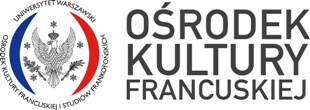Le jeudi de sociologie historique 15/12/2022 – Ivan Nikolovski & Naum Trajanovski

Le Centre de civilisation française et d’études francophones de l’Université de Varsovie, la Faculté de sociologie de l’Université de Varsovie et la Section de sociologie historique de l’Association polonaise de sociologie vous invitent à la rencontre dans le cadre du cycle
LES JEUDIS DE SOCIOLOGIE HISTORIQUE
le jeudi 15 décembre 2022, 17h00
Securitization from below: the non-state mnemonic actors in Bulgaria – North Macedonia historical dispute
Ivan Nikolovski (CEU Vienna)
Naum Trajanovski (IS UW)
Commentaire:
Tchavdar Marinov (Bulg. Acad. of Sciences)
Petar Todorov (Inst. of Nat. History, Skopje)
La rencontre se tiendra en anglais.
Elle aura lieu en présentiel (à la bibliothèque du CCFEF, salle 3.012 au 55 rue Dobra) et à distance via Zoom – il est nécessaire de s’inscrire préalablement : n.maslowski@uw.edu.pl ou okf@uw.edu.pl.
Veuillez noter que la réunion est enregistrée. L’enregistrement sera utilisé à des fins scientifiques. La participation à la rencontre équivaut à donner son consentement.
Plus d’informations : https://www.facebook.com/groups/606811919731350/
SECURITIZATION FROM BELOW. THE NON-STATE MNEMONIC ACTORS IN BULGARIA – NORTH MACEDONIA HISTORICAL DISPUTE
The literature on mnemonic (and ontological) security in international relations has been rather state-centric, looking at security-seeking practices as prerogatives of the state. However, little has been said about the agency of non-state actors in matters of ontological (in)security between states. We argue that non-state mnemonic actors, such as historians, public intellectuals, and politicians can influence inter-state relations in ontological security terms. Even when states agree to desecuritize contentious historical narratives in pursuit of reconciliation, non-state actors can remain trapped in mnemonic security dilemmas. Acting as mnemonic warriors, they (re)securitize the historical narratives that they believe need to be defended at any cost. Confronted with opposition, states not only revert their policies of desecuritization, but securitize the mnemonic accounts by legal and political means, only to return to the spiral of mutually reinforcing ontological insecurities. We illustrate our points by closely analyzing the historical and identity-related dispute between Bulgaria and North Macedonia, starting from 2017 when the two countries signed the Treaty on good neighborly relations and cooperation. The discussion will be focused on the context of North Macedonia.
Ivan Nikolovski is a Ph.D. candidate at Central European University’s Doctoral School of Political Science, Public Policy, and International Relations in Vienna. Nikolovski closely analyzes the Europeanization of the contested collective memories and national identities in North Macedonia and Monte-negro. He recently published North Macedonia: A fertile ground for external influences” (together with Zoran Nechev, in The Western Balkans in the World, ed. by Bieber and Tzifakis, 2020).
Naum Trajanovski is an assistant at the Faculty of Sociology, University of Warsaw. His academic interests include memory politics in North Macedonia, nationalism studies and sociological knowledge-transfers in East Central and South East Europe. He is the author of a book (in Macedonian) on the Museum of the Macedonian struggle and the Macedonian memory politics (2020).
